LAW340 Equity & Trusts: Case Study Analysis of Mollie's Property
VerifiedAdded on 2023/04/21
|9
|2556
|207
Case Study
AI Summary
This case study assignment analyzes the rights acquired by Cyril, Dominique, and Linda in Mollie's property, focusing on the validity of purported transfers under equity and trust law in New South Wales, Australia. It discusses the nature, creation, and priority of equitable interests, along with the assignment of property in equity. The analysis covers relevant legislation such as the Real Property Act and the Conveyancing Act, examining key concepts like choses in action, future property, and the role of consideration in equitable assignments. Landmark cases like Barry v Haider, Norman v Federal Commissioner of Taxation, Milroy v Lord, and Corrin v Patton are referenced to support the legal reasoning. The application of these principles is then applied to Mollie's attempted transfers to Cyril (debt assignment) and Dominique (house transfer), concluding whether these transfers are valid and enforceable under equitable principles.
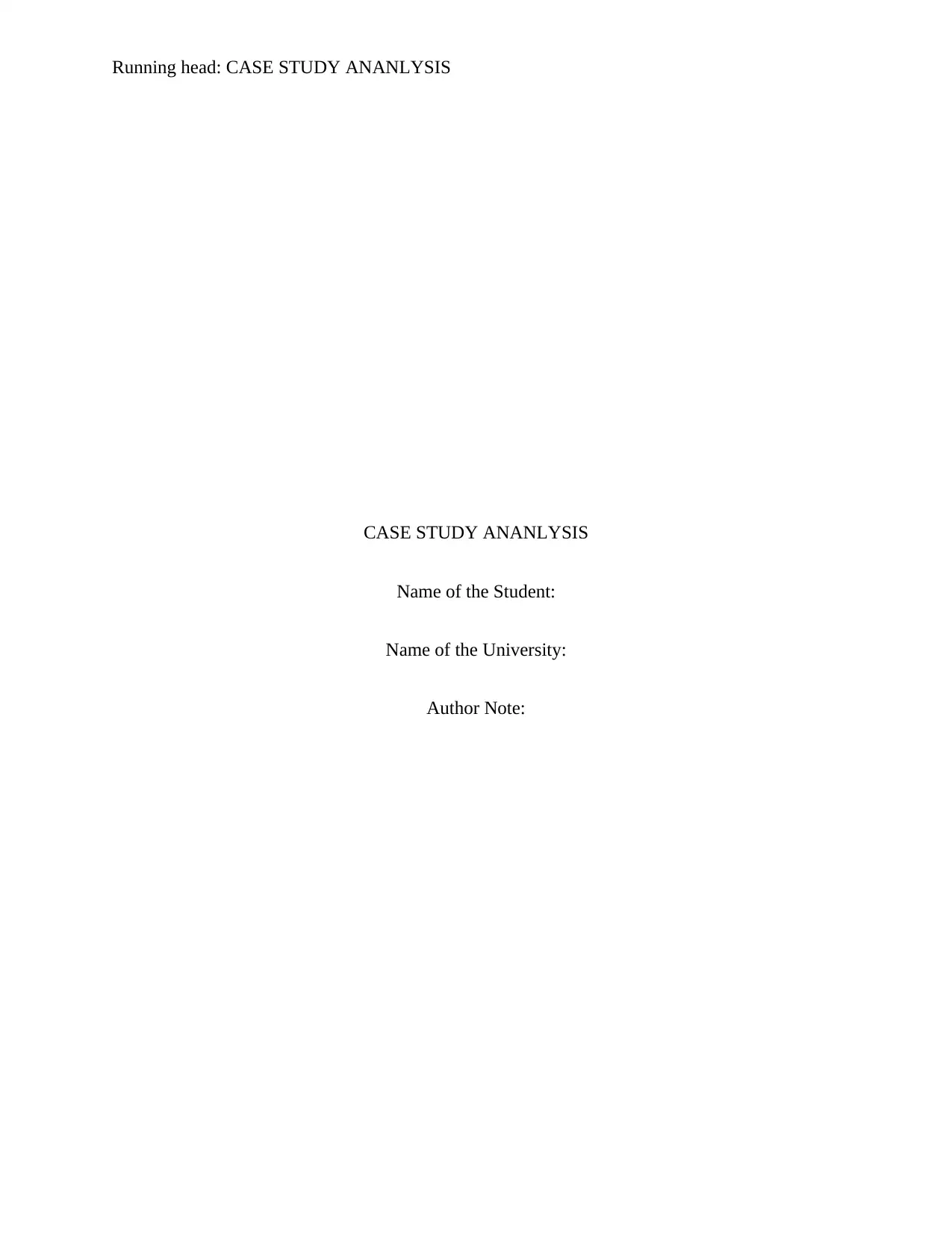
Running head: CASE STUDY ANANLYSIS
CASE STUDY ANANLYSIS
Name of the Student:
Name of the University:
Author Note:
CASE STUDY ANANLYSIS
Name of the Student:
Name of the University:
Author Note:
Paraphrase This Document
Need a fresh take? Get an instant paraphrase of this document with our AI Paraphraser
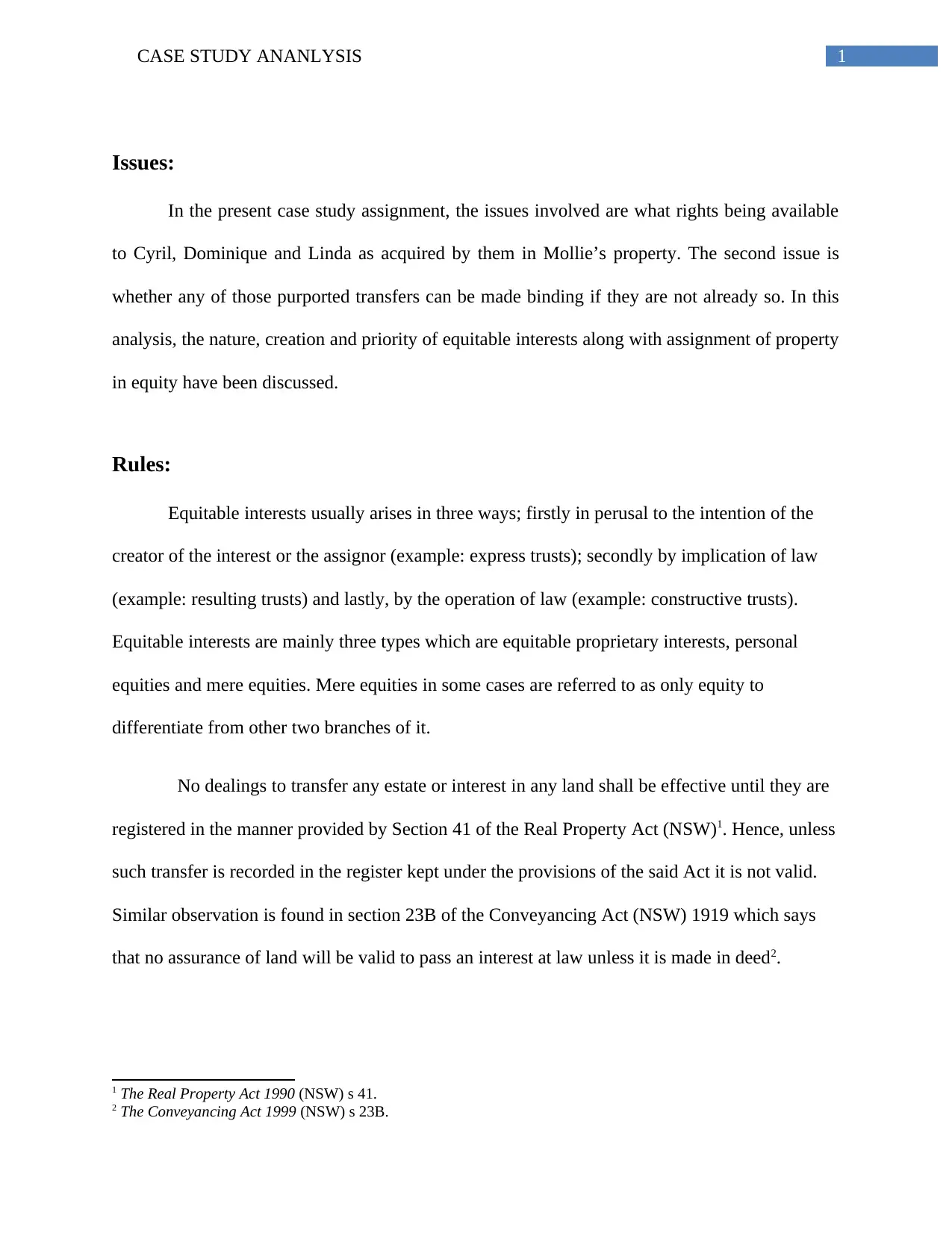
1CASE STUDY ANANLYSIS
Issues:
In the present case study assignment, the issues involved are what rights being available
to Cyril, Dominique and Linda as acquired by them in Mollie’s property. The second issue is
whether any of those purported transfers can be made binding if they are not already so. In this
analysis, the nature, creation and priority of equitable interests along with assignment of property
in equity have been discussed.
Rules:
Equitable interests usually arises in three ways; firstly in perusal to the intention of the
creator of the interest or the assignor (example: express trusts); secondly by implication of law
(example: resulting trusts) and lastly, by the operation of law (example: constructive trusts).
Equitable interests are mainly three types which are equitable proprietary interests, personal
equities and mere equities. Mere equities in some cases are referred to as only equity to
differentiate from other two branches of it.
No dealings to transfer any estate or interest in any land shall be effective until they are
registered in the manner provided by Section 41 of the Real Property Act (NSW)1. Hence, unless
such transfer is recorded in the register kept under the provisions of the said Act it is not valid.
Similar observation is found in section 23B of the Conveyancing Act (NSW) 1919 which says
that no assurance of land will be valid to pass an interest at law unless it is made in deed2.
1 The Real Property Act 1990 (NSW) s 41.
2 The Conveyancing Act 1999 (NSW) s 23B.
Issues:
In the present case study assignment, the issues involved are what rights being available
to Cyril, Dominique and Linda as acquired by them in Mollie’s property. The second issue is
whether any of those purported transfers can be made binding if they are not already so. In this
analysis, the nature, creation and priority of equitable interests along with assignment of property
in equity have been discussed.
Rules:
Equitable interests usually arises in three ways; firstly in perusal to the intention of the
creator of the interest or the assignor (example: express trusts); secondly by implication of law
(example: resulting trusts) and lastly, by the operation of law (example: constructive trusts).
Equitable interests are mainly three types which are equitable proprietary interests, personal
equities and mere equities. Mere equities in some cases are referred to as only equity to
differentiate from other two branches of it.
No dealings to transfer any estate or interest in any land shall be effective until they are
registered in the manner provided by Section 41 of the Real Property Act (NSW)1. Hence, unless
such transfer is recorded in the register kept under the provisions of the said Act it is not valid.
Similar observation is found in section 23B of the Conveyancing Act (NSW) 1919 which says
that no assurance of land will be valid to pass an interest at law unless it is made in deed2.
1 The Real Property Act 1990 (NSW) s 41.
2 The Conveyancing Act 1999 (NSW) s 23B.
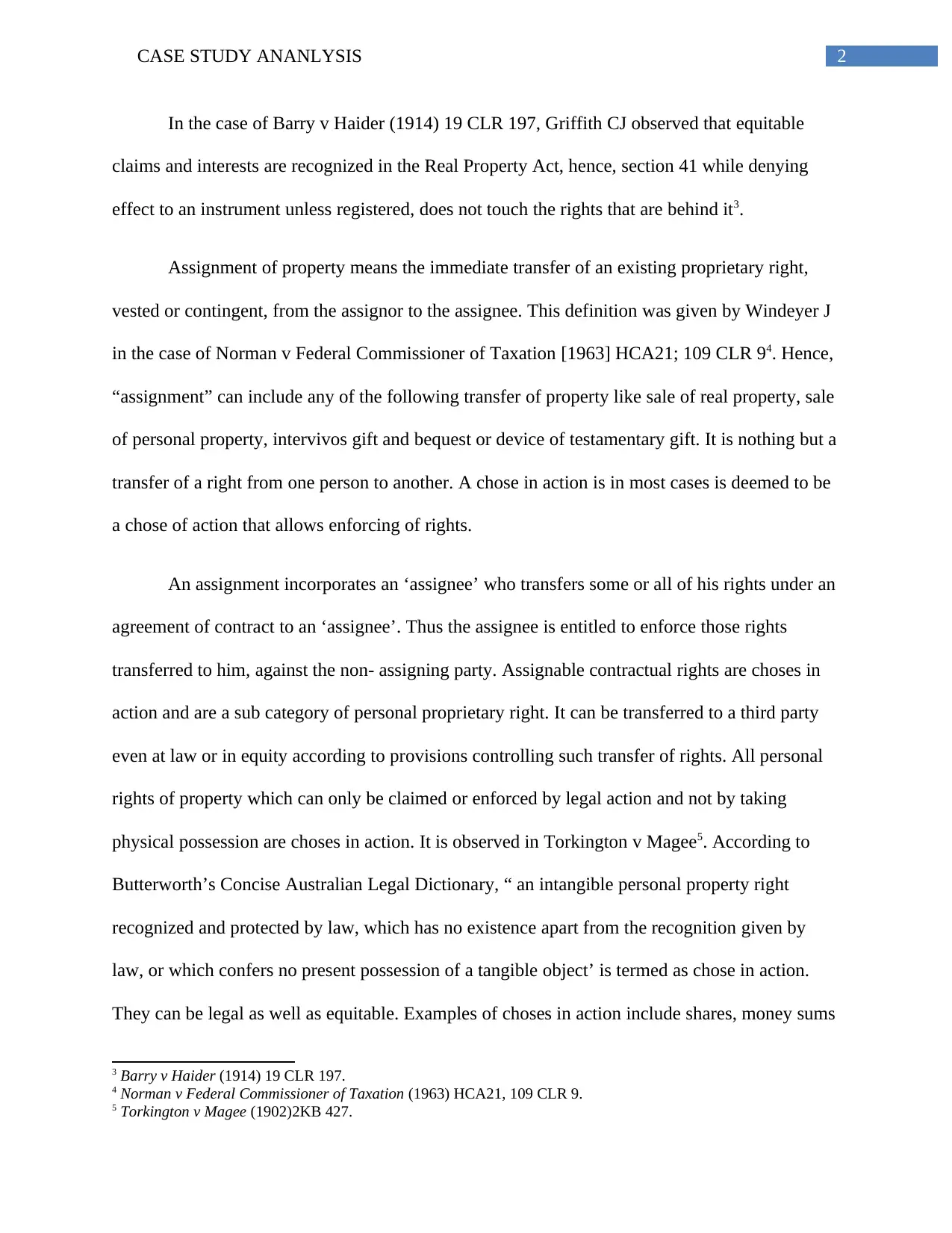
2CASE STUDY ANANLYSIS
In the case of Barry v Haider (1914) 19 CLR 197, Griffith CJ observed that equitable
claims and interests are recognized in the Real Property Act, hence, section 41 while denying
effect to an instrument unless registered, does not touch the rights that are behind it3.
Assignment of property means the immediate transfer of an existing proprietary right,
vested or contingent, from the assignor to the assignee. This definition was given by Windeyer J
in the case of Norman v Federal Commissioner of Taxation [1963] HCA21; 109 CLR 94. Hence,
“assignment” can include any of the following transfer of property like sale of real property, sale
of personal property, intervivos gift and bequest or device of testamentary gift. It is nothing but a
transfer of a right from one person to another. A chose in action is in most cases is deemed to be
a chose of action that allows enforcing of rights.
An assignment incorporates an ‘assignee’ who transfers some or all of his rights under an
agreement of contract to an ‘assignee’. Thus the assignee is entitled to enforce those rights
transferred to him, against the non- assigning party. Assignable contractual rights are choses in
action and are a sub category of personal proprietary right. It can be transferred to a third party
even at law or in equity according to provisions controlling such transfer of rights. All personal
rights of property which can only be claimed or enforced by legal action and not by taking
physical possession are choses in action. It is observed in Torkington v Magee5. According to
Butterworth’s Concise Australian Legal Dictionary, “ an intangible personal property right
recognized and protected by law, which has no existence apart from the recognition given by
law, or which confers no present possession of a tangible object’ is termed as chose in action.
They can be legal as well as equitable. Examples of choses in action include shares, money sums
3 Barry v Haider (1914) 19 CLR 197.
4 Norman v Federal Commissioner of Taxation (1963) HCA21, 109 CLR 9.
5 Torkington v Magee (1902)2KB 427.
In the case of Barry v Haider (1914) 19 CLR 197, Griffith CJ observed that equitable
claims and interests are recognized in the Real Property Act, hence, section 41 while denying
effect to an instrument unless registered, does not touch the rights that are behind it3.
Assignment of property means the immediate transfer of an existing proprietary right,
vested or contingent, from the assignor to the assignee. This definition was given by Windeyer J
in the case of Norman v Federal Commissioner of Taxation [1963] HCA21; 109 CLR 94. Hence,
“assignment” can include any of the following transfer of property like sale of real property, sale
of personal property, intervivos gift and bequest or device of testamentary gift. It is nothing but a
transfer of a right from one person to another. A chose in action is in most cases is deemed to be
a chose of action that allows enforcing of rights.
An assignment incorporates an ‘assignee’ who transfers some or all of his rights under an
agreement of contract to an ‘assignee’. Thus the assignee is entitled to enforce those rights
transferred to him, against the non- assigning party. Assignable contractual rights are choses in
action and are a sub category of personal proprietary right. It can be transferred to a third party
even at law or in equity according to provisions controlling such transfer of rights. All personal
rights of property which can only be claimed or enforced by legal action and not by taking
physical possession are choses in action. It is observed in Torkington v Magee5. According to
Butterworth’s Concise Australian Legal Dictionary, “ an intangible personal property right
recognized and protected by law, which has no existence apart from the recognition given by
law, or which confers no present possession of a tangible object’ is termed as chose in action.
They can be legal as well as equitable. Examples of choses in action include shares, money sums
3 Barry v Haider (1914) 19 CLR 197.
4 Norman v Federal Commissioner of Taxation (1963) HCA21, 109 CLR 9.
5 Torkington v Magee (1902)2KB 427.
⊘ This is a preview!⊘
Do you want full access?
Subscribe today to unlock all pages.

Trusted by 1+ million students worldwide
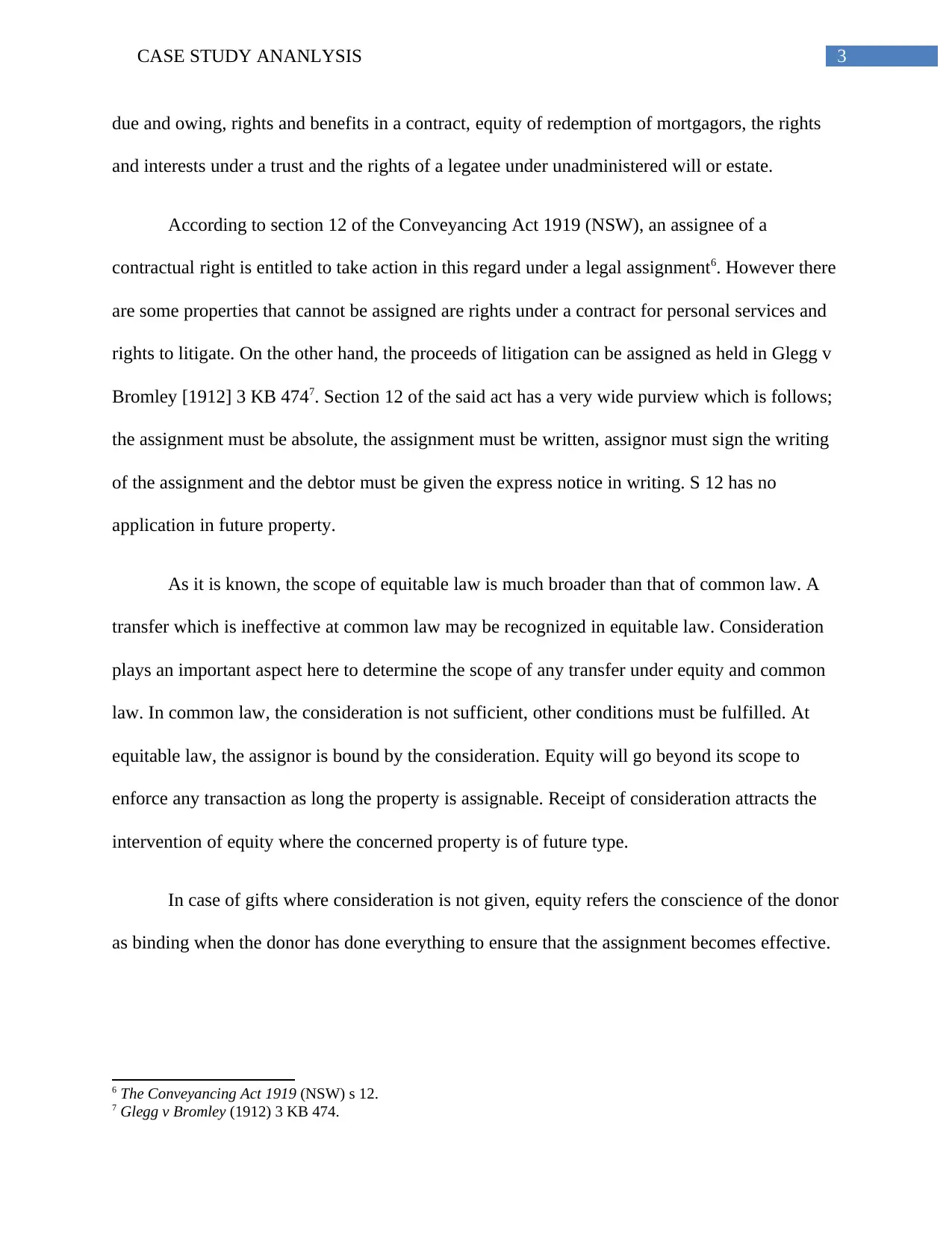
3CASE STUDY ANANLYSIS
due and owing, rights and benefits in a contract, equity of redemption of mortgagors, the rights
and interests under a trust and the rights of a legatee under unadministered will or estate.
According to section 12 of the Conveyancing Act 1919 (NSW), an assignee of a
contractual right is entitled to take action in this regard under a legal assignment6. However there
are some properties that cannot be assigned are rights under a contract for personal services and
rights to litigate. On the other hand, the proceeds of litigation can be assigned as held in Glegg v
Bromley [1912] 3 KB 4747. Section 12 of the said act has a very wide purview which is follows;
the assignment must be absolute, the assignment must be written, assignor must sign the writing
of the assignment and the debtor must be given the express notice in writing. S 12 has no
application in future property.
As it is known, the scope of equitable law is much broader than that of common law. A
transfer which is ineffective at common law may be recognized in equitable law. Consideration
plays an important aspect here to determine the scope of any transfer under equity and common
law. In common law, the consideration is not sufficient, other conditions must be fulfilled. At
equitable law, the assignor is bound by the consideration. Equity will go beyond its scope to
enforce any transaction as long the property is assignable. Receipt of consideration attracts the
intervention of equity where the concerned property is of future type.
In case of gifts where consideration is not given, equity refers the conscience of the donor
as binding when the donor has done everything to ensure that the assignment becomes effective.
6 The Conveyancing Act 1919 (NSW) s 12.
7 Glegg v Bromley (1912) 3 KB 474.
due and owing, rights and benefits in a contract, equity of redemption of mortgagors, the rights
and interests under a trust and the rights of a legatee under unadministered will or estate.
According to section 12 of the Conveyancing Act 1919 (NSW), an assignee of a
contractual right is entitled to take action in this regard under a legal assignment6. However there
are some properties that cannot be assigned are rights under a contract for personal services and
rights to litigate. On the other hand, the proceeds of litigation can be assigned as held in Glegg v
Bromley [1912] 3 KB 4747. Section 12 of the said act has a very wide purview which is follows;
the assignment must be absolute, the assignment must be written, assignor must sign the writing
of the assignment and the debtor must be given the express notice in writing. S 12 has no
application in future property.
As it is known, the scope of equitable law is much broader than that of common law. A
transfer which is ineffective at common law may be recognized in equitable law. Consideration
plays an important aspect here to determine the scope of any transfer under equity and common
law. In common law, the consideration is not sufficient, other conditions must be fulfilled. At
equitable law, the assignor is bound by the consideration. Equity will go beyond its scope to
enforce any transaction as long the property is assignable. Receipt of consideration attracts the
intervention of equity where the concerned property is of future type.
In case of gifts where consideration is not given, equity refers the conscience of the donor
as binding when the donor has done everything to ensure that the assignment becomes effective.
6 The Conveyancing Act 1919 (NSW) s 12.
7 Glegg v Bromley (1912) 3 KB 474.
Paraphrase This Document
Need a fresh take? Get an instant paraphrase of this document with our AI Paraphraser
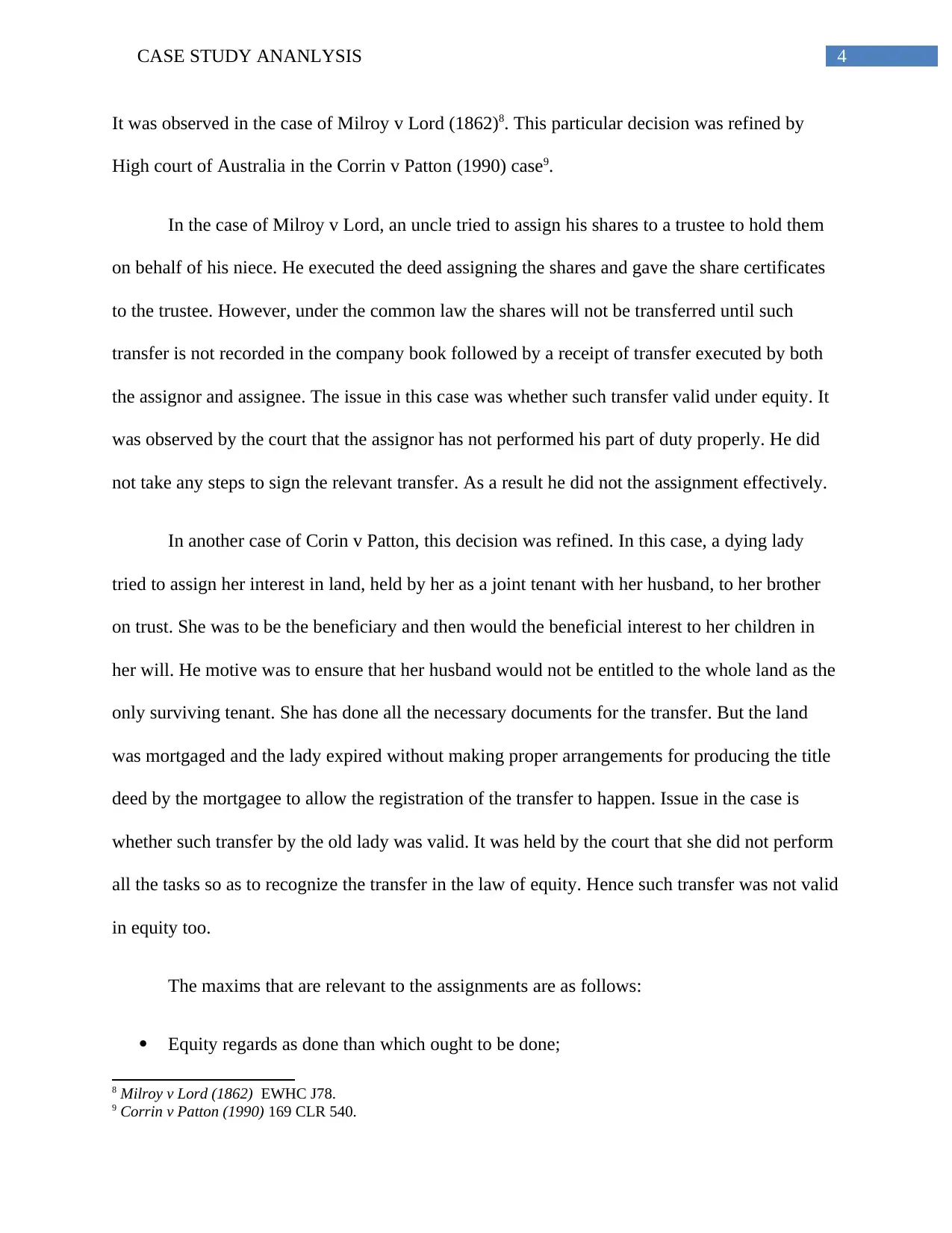
4CASE STUDY ANANLYSIS
It was observed in the case of Milroy v Lord (1862)8. This particular decision was refined by
High court of Australia in the Corrin v Patton (1990) case9.
In the case of Milroy v Lord, an uncle tried to assign his shares to a trustee to hold them
on behalf of his niece. He executed the deed assigning the shares and gave the share certificates
to the trustee. However, under the common law the shares will not be transferred until such
transfer is not recorded in the company book followed by a receipt of transfer executed by both
the assignor and assignee. The issue in this case was whether such transfer valid under equity. It
was observed by the court that the assignor has not performed his part of duty properly. He did
not take any steps to sign the relevant transfer. As a result he did not the assignment effectively.
In another case of Corin v Patton, this decision was refined. In this case, a dying lady
tried to assign her interest in land, held by her as a joint tenant with her husband, to her brother
on trust. She was to be the beneficiary and then would the beneficial interest to her children in
her will. He motive was to ensure that her husband would not be entitled to the whole land as the
only surviving tenant. She has done all the necessary documents for the transfer. But the land
was mortgaged and the lady expired without making proper arrangements for producing the title
deed by the mortgagee to allow the registration of the transfer to happen. Issue in the case is
whether such transfer by the old lady was valid. It was held by the court that she did not perform
all the tasks so as to recognize the transfer in the law of equity. Hence such transfer was not valid
in equity too.
The maxims that are relevant to the assignments are as follows:
Equity regards as done than which ought to be done;
8 Milroy v Lord (1862) EWHC J78.
9 Corrin v Patton (1990) 169 CLR 540.
It was observed in the case of Milroy v Lord (1862)8. This particular decision was refined by
High court of Australia in the Corrin v Patton (1990) case9.
In the case of Milroy v Lord, an uncle tried to assign his shares to a trustee to hold them
on behalf of his niece. He executed the deed assigning the shares and gave the share certificates
to the trustee. However, under the common law the shares will not be transferred until such
transfer is not recorded in the company book followed by a receipt of transfer executed by both
the assignor and assignee. The issue in this case was whether such transfer valid under equity. It
was observed by the court that the assignor has not performed his part of duty properly. He did
not take any steps to sign the relevant transfer. As a result he did not the assignment effectively.
In another case of Corin v Patton, this decision was refined. In this case, a dying lady
tried to assign her interest in land, held by her as a joint tenant with her husband, to her brother
on trust. She was to be the beneficiary and then would the beneficial interest to her children in
her will. He motive was to ensure that her husband would not be entitled to the whole land as the
only surviving tenant. She has done all the necessary documents for the transfer. But the land
was mortgaged and the lady expired without making proper arrangements for producing the title
deed by the mortgagee to allow the registration of the transfer to happen. Issue in the case is
whether such transfer by the old lady was valid. It was held by the court that she did not perform
all the tasks so as to recognize the transfer in the law of equity. Hence such transfer was not valid
in equity too.
The maxims that are relevant to the assignments are as follows:
Equity regards as done than which ought to be done;
8 Milroy v Lord (1862) EWHC J78.
9 Corrin v Patton (1990) 169 CLR 540.
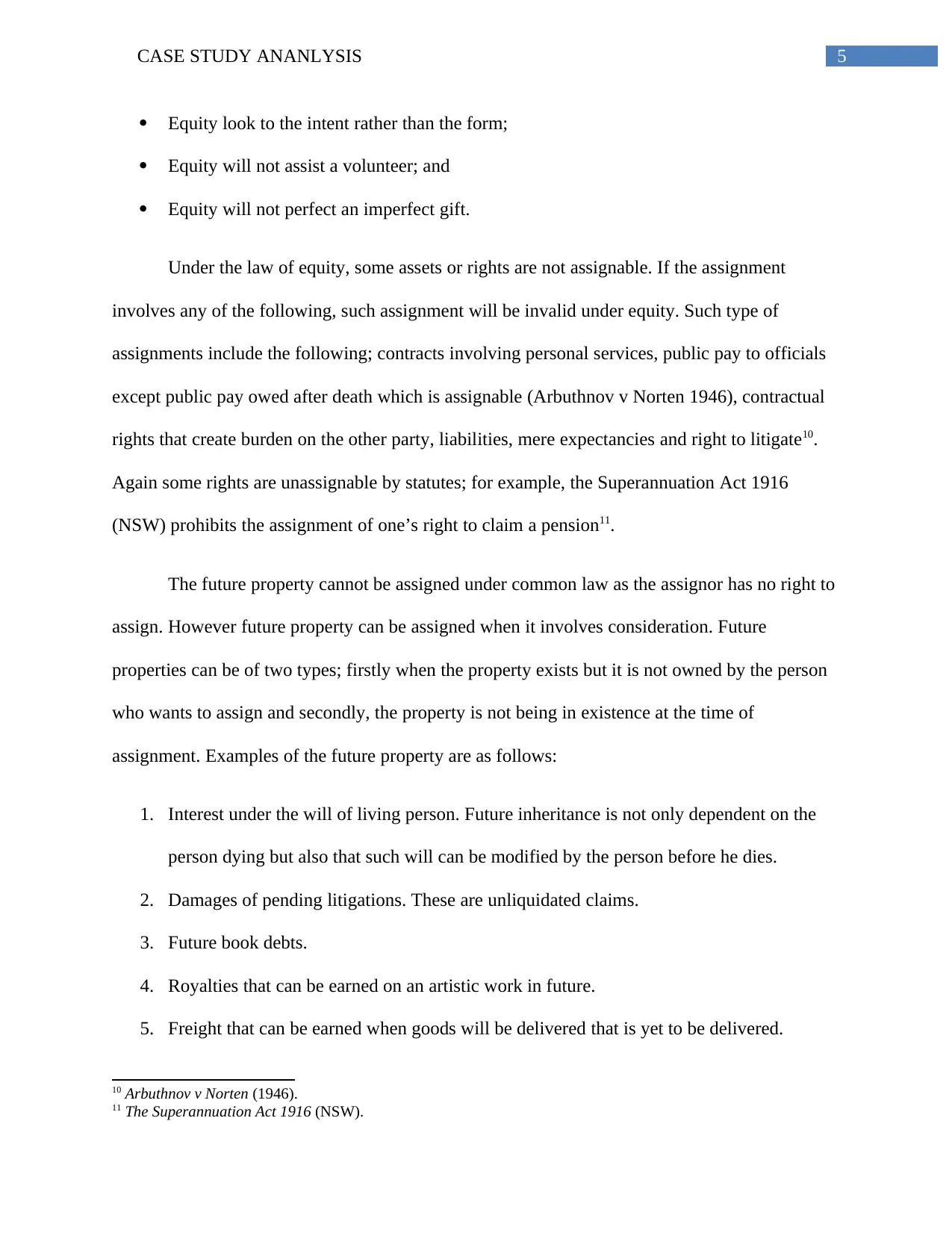
5CASE STUDY ANANLYSIS
Equity look to the intent rather than the form;
Equity will not assist a volunteer; and
Equity will not perfect an imperfect gift.
Under the law of equity, some assets or rights are not assignable. If the assignment
involves any of the following, such assignment will be invalid under equity. Such type of
assignments include the following; contracts involving personal services, public pay to officials
except public pay owed after death which is assignable (Arbuthnov v Norten 1946), contractual
rights that create burden on the other party, liabilities, mere expectancies and right to litigate10.
Again some rights are unassignable by statutes; for example, the Superannuation Act 1916
(NSW) prohibits the assignment of one’s right to claim a pension11.
The future property cannot be assigned under common law as the assignor has no right to
assign. However future property can be assigned when it involves consideration. Future
properties can be of two types; firstly when the property exists but it is not owned by the person
who wants to assign and secondly, the property is not being in existence at the time of
assignment. Examples of the future property are as follows:
1. Interest under the will of living person. Future inheritance is not only dependent on the
person dying but also that such will can be modified by the person before he dies.
2. Damages of pending litigations. These are unliquidated claims.
3. Future book debts.
4. Royalties that can be earned on an artistic work in future.
5. Freight that can be earned when goods will be delivered that is yet to be delivered.
10 Arbuthnov v Norten (1946).
11 The Superannuation Act 1916 (NSW).
Equity look to the intent rather than the form;
Equity will not assist a volunteer; and
Equity will not perfect an imperfect gift.
Under the law of equity, some assets or rights are not assignable. If the assignment
involves any of the following, such assignment will be invalid under equity. Such type of
assignments include the following; contracts involving personal services, public pay to officials
except public pay owed after death which is assignable (Arbuthnov v Norten 1946), contractual
rights that create burden on the other party, liabilities, mere expectancies and right to litigate10.
Again some rights are unassignable by statutes; for example, the Superannuation Act 1916
(NSW) prohibits the assignment of one’s right to claim a pension11.
The future property cannot be assigned under common law as the assignor has no right to
assign. However future property can be assigned when it involves consideration. Future
properties can be of two types; firstly when the property exists but it is not owned by the person
who wants to assign and secondly, the property is not being in existence at the time of
assignment. Examples of the future property are as follows:
1. Interest under the will of living person. Future inheritance is not only dependent on the
person dying but also that such will can be modified by the person before he dies.
2. Damages of pending litigations. These are unliquidated claims.
3. Future book debts.
4. Royalties that can be earned on an artistic work in future.
5. Freight that can be earned when goods will be delivered that is yet to be delivered.
10 Arbuthnov v Norten (1946).
11 The Superannuation Act 1916 (NSW).
⊘ This is a preview!⊘
Do you want full access?
Subscribe today to unlock all pages.

Trusted by 1+ million students worldwide
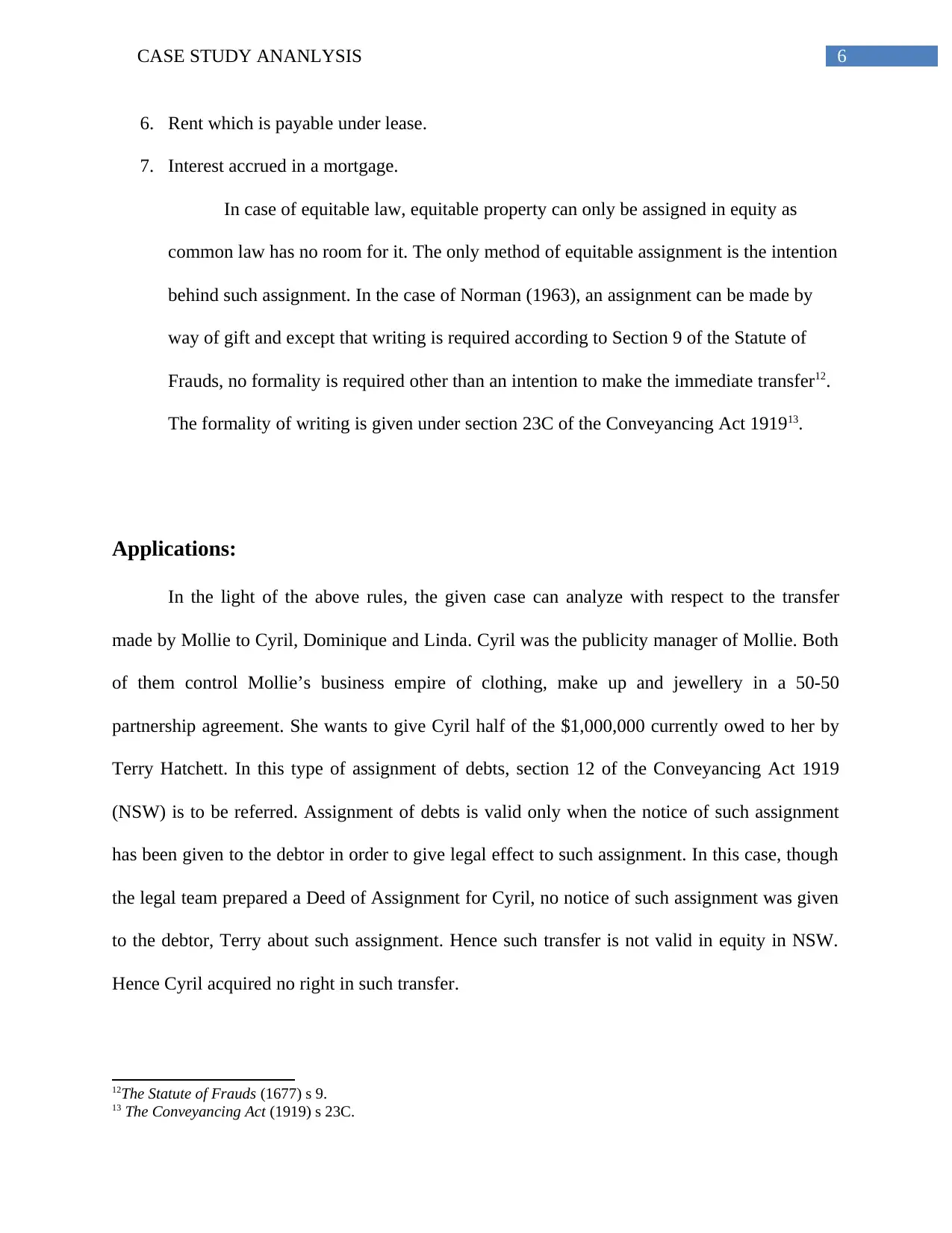
6CASE STUDY ANANLYSIS
6. Rent which is payable under lease.
7. Interest accrued in a mortgage.
In case of equitable law, equitable property can only be assigned in equity as
common law has no room for it. The only method of equitable assignment is the intention
behind such assignment. In the case of Norman (1963), an assignment can be made by
way of gift and except that writing is required according to Section 9 of the Statute of
Frauds, no formality is required other than an intention to make the immediate transfer12.
The formality of writing is given under section 23C of the Conveyancing Act 191913.
Applications:
In the light of the above rules, the given case can analyze with respect to the transfer
made by Mollie to Cyril, Dominique and Linda. Cyril was the publicity manager of Mollie. Both
of them control Mollie’s business empire of clothing, make up and jewellery in a 50-50
partnership agreement. She wants to give Cyril half of the $1,000,000 currently owed to her by
Terry Hatchett. In this type of assignment of debts, section 12 of the Conveyancing Act 1919
(NSW) is to be referred. Assignment of debts is valid only when the notice of such assignment
has been given to the debtor in order to give legal effect to such assignment. In this case, though
the legal team prepared a Deed of Assignment for Cyril, no notice of such assignment was given
to the debtor, Terry about such assignment. Hence such transfer is not valid in equity in NSW.
Hence Cyril acquired no right in such transfer.
12The Statute of Frauds (1677) s 9.
13 The Conveyancing Act (1919) s 23C.
6. Rent which is payable under lease.
7. Interest accrued in a mortgage.
In case of equitable law, equitable property can only be assigned in equity as
common law has no room for it. The only method of equitable assignment is the intention
behind such assignment. In the case of Norman (1963), an assignment can be made by
way of gift and except that writing is required according to Section 9 of the Statute of
Frauds, no formality is required other than an intention to make the immediate transfer12.
The formality of writing is given under section 23C of the Conveyancing Act 191913.
Applications:
In the light of the above rules, the given case can analyze with respect to the transfer
made by Mollie to Cyril, Dominique and Linda. Cyril was the publicity manager of Mollie. Both
of them control Mollie’s business empire of clothing, make up and jewellery in a 50-50
partnership agreement. She wants to give Cyril half of the $1,000,000 currently owed to her by
Terry Hatchett. In this type of assignment of debts, section 12 of the Conveyancing Act 1919
(NSW) is to be referred. Assignment of debts is valid only when the notice of such assignment
has been given to the debtor in order to give legal effect to such assignment. In this case, though
the legal team prepared a Deed of Assignment for Cyril, no notice of such assignment was given
to the debtor, Terry about such assignment. Hence such transfer is not valid in equity in NSW.
Hence Cyril acquired no right in such transfer.
12The Statute of Frauds (1677) s 9.
13 The Conveyancing Act (1919) s 23C.
Paraphrase This Document
Need a fresh take? Get an instant paraphrase of this document with our AI Paraphraser
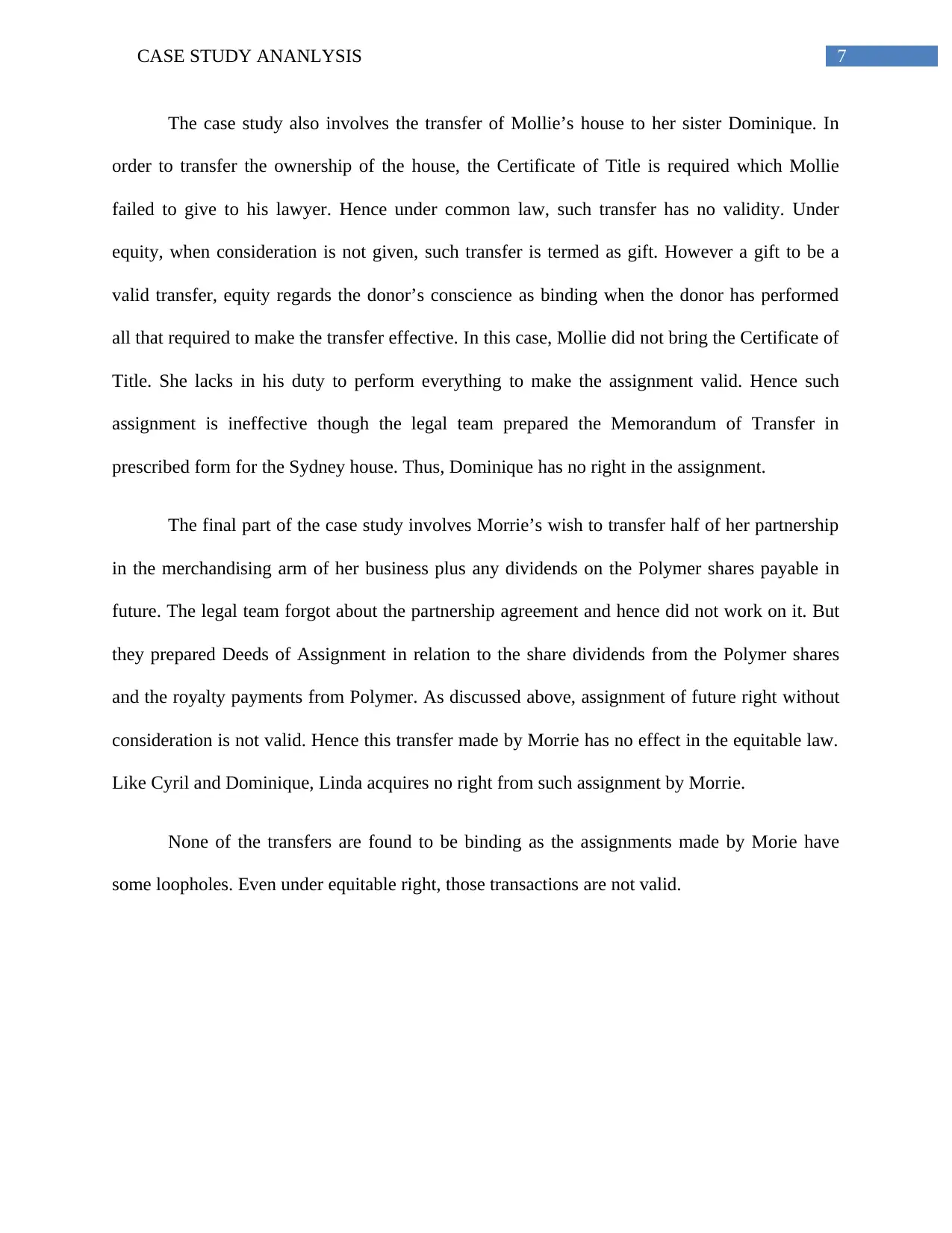
7CASE STUDY ANANLYSIS
The case study also involves the transfer of Mollie’s house to her sister Dominique. In
order to transfer the ownership of the house, the Certificate of Title is required which Mollie
failed to give to his lawyer. Hence under common law, such transfer has no validity. Under
equity, when consideration is not given, such transfer is termed as gift. However a gift to be a
valid transfer, equity regards the donor’s conscience as binding when the donor has performed
all that required to make the transfer effective. In this case, Mollie did not bring the Certificate of
Title. She lacks in his duty to perform everything to make the assignment valid. Hence such
assignment is ineffective though the legal team prepared the Memorandum of Transfer in
prescribed form for the Sydney house. Thus, Dominique has no right in the assignment.
The final part of the case study involves Morrie’s wish to transfer half of her partnership
in the merchandising arm of her business plus any dividends on the Polymer shares payable in
future. The legal team forgot about the partnership agreement and hence did not work on it. But
they prepared Deeds of Assignment in relation to the share dividends from the Polymer shares
and the royalty payments from Polymer. As discussed above, assignment of future right without
consideration is not valid. Hence this transfer made by Morrie has no effect in the equitable law.
Like Cyril and Dominique, Linda acquires no right from such assignment by Morrie.
None of the transfers are found to be binding as the assignments made by Morie have
some loopholes. Even under equitable right, those transactions are not valid.
The case study also involves the transfer of Mollie’s house to her sister Dominique. In
order to transfer the ownership of the house, the Certificate of Title is required which Mollie
failed to give to his lawyer. Hence under common law, such transfer has no validity. Under
equity, when consideration is not given, such transfer is termed as gift. However a gift to be a
valid transfer, equity regards the donor’s conscience as binding when the donor has performed
all that required to make the transfer effective. In this case, Mollie did not bring the Certificate of
Title. She lacks in his duty to perform everything to make the assignment valid. Hence such
assignment is ineffective though the legal team prepared the Memorandum of Transfer in
prescribed form for the Sydney house. Thus, Dominique has no right in the assignment.
The final part of the case study involves Morrie’s wish to transfer half of her partnership
in the merchandising arm of her business plus any dividends on the Polymer shares payable in
future. The legal team forgot about the partnership agreement and hence did not work on it. But
they prepared Deeds of Assignment in relation to the share dividends from the Polymer shares
and the royalty payments from Polymer. As discussed above, assignment of future right without
consideration is not valid. Hence this transfer made by Morrie has no effect in the equitable law.
Like Cyril and Dominique, Linda acquires no right from such assignment by Morrie.
None of the transfers are found to be binding as the assignments made by Morie have
some loopholes. Even under equitable right, those transactions are not valid.
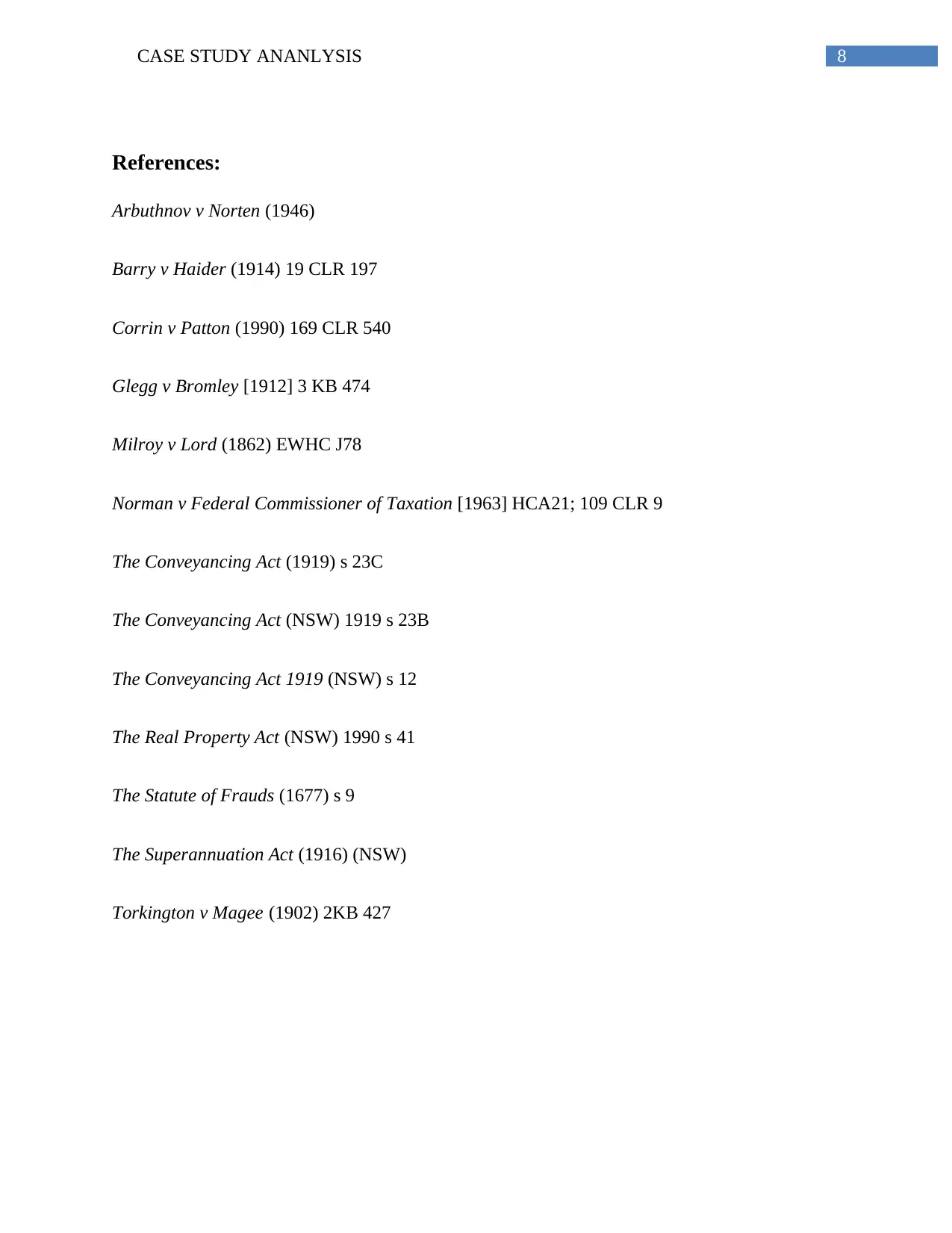
8CASE STUDY ANANLYSIS
References:
Arbuthnov v Norten (1946)
Barry v Haider (1914) 19 CLR 197
Corrin v Patton (1990) 169 CLR 540
Glegg v Bromley [1912] 3 KB 474
Milroy v Lord (1862) EWHC J78
Norman v Federal Commissioner of Taxation [1963] HCA21; 109 CLR 9
The Conveyancing Act (1919) s 23C
The Conveyancing Act (NSW) 1919 s 23B
The Conveyancing Act 1919 (NSW) s 12
The Real Property Act (NSW) 1990 s 41
The Statute of Frauds (1677) s 9
The Superannuation Act (1916) (NSW)
Torkington v Magee (1902) 2KB 427
References:
Arbuthnov v Norten (1946)
Barry v Haider (1914) 19 CLR 197
Corrin v Patton (1990) 169 CLR 540
Glegg v Bromley [1912] 3 KB 474
Milroy v Lord (1862) EWHC J78
Norman v Federal Commissioner of Taxation [1963] HCA21; 109 CLR 9
The Conveyancing Act (1919) s 23C
The Conveyancing Act (NSW) 1919 s 23B
The Conveyancing Act 1919 (NSW) s 12
The Real Property Act (NSW) 1990 s 41
The Statute of Frauds (1677) s 9
The Superannuation Act (1916) (NSW)
Torkington v Magee (1902) 2KB 427
⊘ This is a preview!⊘
Do you want full access?
Subscribe today to unlock all pages.

Trusted by 1+ million students worldwide
1 out of 9
Related Documents
Your All-in-One AI-Powered Toolkit for Academic Success.
+13062052269
info@desklib.com
Available 24*7 on WhatsApp / Email
![[object Object]](/_next/static/media/star-bottom.7253800d.svg)
Unlock your academic potential
Copyright © 2020–2026 A2Z Services. All Rights Reserved. Developed and managed by ZUCOL.





